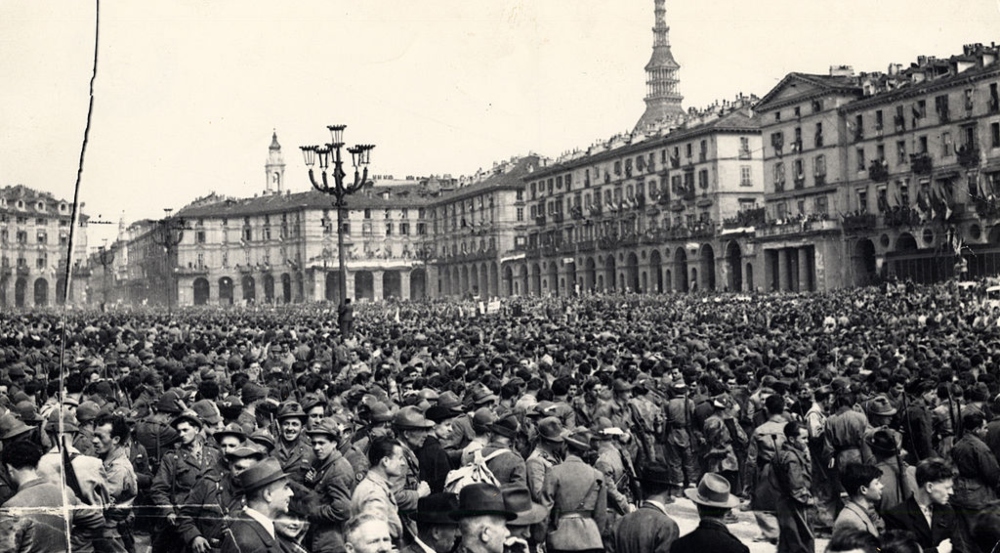April 25 is a holiday in Italy known as Liberation Day (Festa della liberazione), which commemorates the period in April of 1945 when the Allied armies of the United States, Great Britain, Canada, Australia, and exiled Poland, together with the Italian resistance movement, finally freed the country of the Nazi occupation and of Italy’s own Fascist rulers.
Recently, while meandering through a nearby street market, I passed a big poster reminding people of this commemoration, and my wife and I certainly plan to attend. The holiday is celebrated with speeches, parades, wreath-laying ceremonies, flyovers, and other festivities.

Ever since moving to Italy in 2017, I have stocked up on nonfiction books about Italy during World War II. As we all learned, Italy under Mussolini’s iron grip joined Hitler’s National Socialist movement to conquer Europe from Moscow to Bordeaux, from the Arctic Circle to North Africa. And in strikingly fast and brutal miliary campaigns, they almost pulled it off.
Midway through the war, the tide was turning against the German juggernaut, as British and American forces poured into Sicily. Predicting the likely outcome of battles, however protracted they might be, the Italian monarchy asked for an armistice to minimize massive civilian bloodshed. In the fall of 1943, Italy essentially changed sides in the war. By then the writing was on the wall. Relentless Allied bombing raids had already pounded many German cities to piles of rubble and dirt — monuments, museums, schools, apartments, factories — nothing was exempt.
To save his country, King Victor Emmanuel III decided that short-term suffering was better than long-term devastation. One cannot possibly imagine what happens when, in the middle of a war, your ally becomes your enemy overnight. Though Mussolini was arrested and hidden in a secret mountain retreat far away from his supporters, the wartime situation remained grim and uncertain.
Germany decided to make Italy pay for its betrayal. Hitler sent a crack team of paratroopers to rescue Il Duce and set him up to lead a puppet government in the north portion of the country. Then German occupying forces laced the peninsula with defensive fortifications that managed to slow down the advance of the allied armies for over 18 months. Eventually the strategy for freeing Europe shifted from Italy to Normandy.
During that period, Italians paid a dear price for their disloyalty to the Reich. Germany rounded up all remaining Jews in Italy and sent them to death camps, mainly in Poland. Any sabotage by the Italian resistance was met with swift executions of hundreds of ordinary citizens. Today, a notorious cavern filled with bodies in Rome is marked with a memorial, and services are held annually.
Whole families were massacred in villages, including those in our province of Fermo, in east-central Italy. Not far from us are the remnants of a concentration camp enclosed by a high stone wall still topped with now rusty barbed wire in places. A nearby train station was the departure point for people shipped off to gas chambers.
So it is not without reason that the end to the daily horrors of 78 years ago are celebrated with fanfare. It sends chills up my spine now to imagine how many people going about their lives — doing what we all do to eat, learn, converse, and exist — were snatched from life for essentially no reason. Just victims of random murders.
When my wife and I visited Italy 10 years ago, we spent time in Tuscany, staying in several small towns. Each day, for a week in the spring, there was a huge party in the streets and piazzas. We went from town to town not realizing we were retracing the exact steps on the exact dates that each town was liberated. It was not unlike scenes in war movies where mobs of freed people emerge from every direction, singing, dancing, playing music, and cheering. We just happened to find ourselves in the recreation of that joyous period. It was exhilarating and deeply touching.
It is also chilling to realize that many of our present-day neighbors are in fact survivors. Now in their 90s, they witnessed — as children and teenagers — their parents, grandparents, families, and friends shot or hanged in the streets. They experienced something so horrific in daily life that we might only feel in our darkest nightmares.
As a postwar baby boomer, I can only now, 70-plus years later, begin to grasp what it must have meant to an Italian to see an American soldier or tank bearing a white star appear in one’s town. That meant you were — finally — safe.
Discover more from Post Alley
Subscribe to get the latest posts sent to your email.

Not quite as dark, but we were talking this afternoon to our neighbor across the street here in Portugal – today April 25, anniversary of the 1974 Carnation Revolution that ended a 48 year old dictatorship. He remembered the old days pretty well, and not too fondly, though I think the thing people mostly remember is that they were all really, really poor.
The revolution was accomplished in a day and with dramatically little bloodshed. That made real heroes out of the young captains who led it, particularly Salgueiro Maia, but the writing on the wall must have been visible to everyone at that point or there would have been more violence.
This is a good read. And it makes a good point for supporting Ukraine. If I can I’d like to share this.